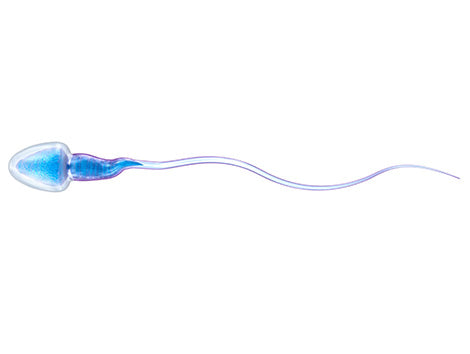
What about sperm quality?

We are used to discussing egg health, but what about sperm quality? A third of infertility cases are due to male factors, so this is an important conversation. ART and IVF have developed methods to get around this by using techniques like ICSI, but what if you could positively impact the quality of your sperm, so that you would have higher numbers of viable sperm to choose from whether you are doing IVF or trying to conceive naturally?
So what does sperm quality mean exactly?
Volume: The volume of semen in a sample
Sperm Count: How many sperm in a semen sample
Sperm Concentration: The amount of sperm per millilitre in a sample
Motility and Progressive Motility: The percentage of moving sperm in a sample. Are they actively swimming? Are they swimming around in circles or swimming in one direction i.e. towards the egg.
Morphology: The percentage of normally sized and shaped sperm within a sample
DNA Fragmentation: The percentage of sperm with DNA damage within a sample
Declining sperm quality
According to WHO (see table below), sperm quality has sharply declined globally over the last 40 years or so. This encompasses falling sperm concentration, reduced motility and morphology, as well as other measures.

Reference values for semen characteristics as published in consecutive WHO manuals.
Why has sperm quality declined?
Although sperm quality has clearly declined in the last couple of generations, the exact causes are not known. Experts believe it to be due to multiple factors including: exposure to environmental toxins known as endocrine disruptors, which include certain plastics, toxic gases, pesticides, herbicides, heavy metals and gases;increase in obesity rates; poor diet; air pollution; radiation.

According to WHO, the average number of sperm with normal morphology was 80% in 1980 compared to 4% normal forms in 2021
How Can Sperm Quality be Improved?
The process of spermatogenesis, the continuous development and production of mature sperm from immature sperm cells, takes 70-100 days. Keeping this in mind, 3 months is the minimum time frame required to optimise sperm quality. And how exactly can this be achieved?
Acupuncture & Chinese Herbal Medicine
After just one acupuncture treatment, testicular blood flow has been proven to increase, positively impacting sperm motility. And 3 months of regular acupuncture treatment combined with herbs and supplements, can show measurable changes to sperm morphology, sperm count, progressive motility and DNA fragmentation. All of which will increase the chances of fertilisation and having a healthy baby.
“Cleaning the pipes” regularly
Research indicates that ejaculating regularly may improve sperm parameters including motility, morphology and DNA fragmentation. Frequent ejaculation encourages the turnover and cleaning out of older sperm in favour of fresher and healthier swimmers.
It is recommended to go no more than 3 days without ejaculating.
Avoid substance abuse
Reduced sperm quality parameters have been linked to both legal and illicit substance abuse. This includes tobacco, more than 2 alcoholic beverages daily, marijuana, anabolic steroids, cocaine, and other recreational drugs.
Maintain a healthy weight
A Harvard study found that overweight men are 11% more likely to have a low sperm count and 39% more likely to have no sperm at all in their ejaculate when compared to men with a healthy BMI. And obese men were 42% more likely to have a low perm count, and 81% more likely to have no sperm in their samples.
Eat organic and healthy
Studies have shown that men who ate more fruit and vegetables, especially legumes and green leafy veggies, had higher sperm counts. Another study indicated that men who ate fruit and vegetables with high pesticide levels, had lower sperm counts and reduced morphology.
Seek out organic fruits, vegetables and meats wherever possible and reduce your intake of foods containing endocrine disrupting substances.
Keep cool
It’s important to keep the reproductive organs cool for optimum sperm production and quality. Looser fitting underwear made from cotton or other natural fibres is ideal. It is also best to avoid saunas, steam rooms, hot tubs and electric blankets.This also means keeping laptops off laps and mobile phones out of pockets.
Lower stress levels
High stress levels are detrimental to our health and wellbeing in general, and can negatively impact sperm production and quality. It can also reduce the libido, making sex and thus conception less likely to occur.
There are many strategies available to combat high stress levels including meditation, physical exercise, breathing exercises, acupuncture and yoga.
Zinc
According to the research, zinc plays an important role in male reproductive health. Sub par levels of zinc are prevalent among men with low sperm counts, volume and reduced testosterone levels. Supplementation may improve sperm parameters and testosterone levels. Zinc may also protect sperm from damage caused by toxins.
Foods rich in Zinc include: pumpkin seeds, shellfish, beef, lamb and pork, eggs and dairy. Taking a supplement is also an option, especially if you are unable to get adequate zinc from dietary sources.
Vitamin D
Research suggests that reduced Vitamin D levels are associated with low sperm counts, motility and morphology as well lowered Inhibin B, a hormone that is important for spermatogenesis.
It is difficult to get adequate Vitamin D from sunlight, particularly during the winter months and especially since we are encouraged to wear sunscreen every day all year round in Australia.
Dietary sources of Vitamin D include oily fish like: salmon, tuna, herring, and sardines; egg yolks; mushrooms; Vitamin D fortified foods. Although if you are quite deficient in Vitamin D, supplementation is the best option. See your doctor or naturopath to determine the correct dosage for you.
